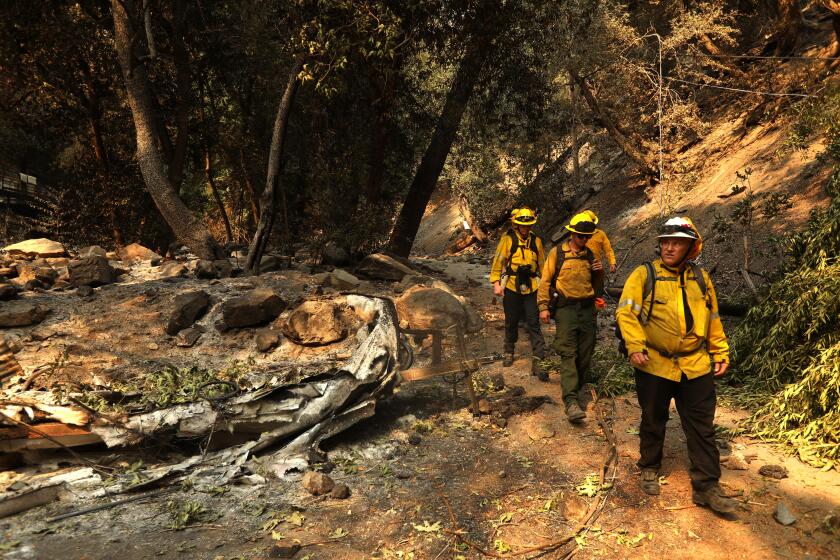There’s no place like home for this world wanderer
Rick Steves lives in Edmonds, Wash., the Norman Rockwell-style town near Seattle where he grew up. From his office window, he can see the junior high he attended. Approaching 50, he’s a family man with a wife of 20 years and a teenage son and a daughter. His voice is warm and confidence-inspiring, like Mr. Rogers. If you met him on the street, you would never guess he is a world traveler.
Steves is the author of 27 books about budget travel -- above all, the ever-popular “Europe Through the Back Door,” which has sold 800,000 copies since it was first published in 1980. He has made 82 travel shows for public television and the Travel Channel, including a 13-episode series scheduled to premiere in October. He also runs Europe Through the Back Door, a tour company based in Edmonds that organizes 200 bus tours through Europe annually. In his spare time, he travels about 120 days a year to keep his information current.
I wanted to know how he went from hometown boy to European travel authority, so I called him in Edmonds, where he was recovering from jet lag after a research trip to Slovenia and Croatia.
Question: What is it about Edmonds that satisfies Rick Steves, world traveler?
Answer: Other people have houses in Tuscany or Portugal, but I’m well-rooted here. I take a walk every morning to get my coffee and almost never have to get out my car. I enjoy having an impact on my town, bringing what I’ve learned home. I’ve got this wonderful springboard. I love leaving, and I love coming home.
Q: When and why did you start traveling?
A: My father imported pianos from Germany. I went to Europe the first time with him when I was 14 and visited piano companies. I didn’t want to go, but right off the bat it was a wonderland. Here was this greasy-haired boy in a turtleneck, seeing beautiful women with hairy armpits. Wow.
After that, I paid for my first trips to Europe by teaching piano. I traveled for fun, told my friends about it, lectured, wrote “Europe Through the Back Door,” which gave me credibility. At the beginning, I did four or five 22-day minivan tours a year. We went without reservations. I made people sign a paper saying they wouldn’t complain if they had to sleep in the bus. The handbooks for those tours became a guidebook series, describing the best 22-day routes in England or Italy [and other European countries]. It was a one-man campaign to get Americans to take longer vacations. But that just didn’t work. Our tours now last from seven to 20 days.
Q: What made you concentrate specifically on Europe?
A: People expect quality. They need reliable phone numbers and prices. I’ve stayed focused on Western Europe so I can go back and update. I’m slowly moving east, but I didn’t see a single American on my last trip to Croatia and Slovenia.
Q: Does your family go with you on research trips?
A: Part of the time. But when I’m in Europe, I’m working. Sometimes I have to visit 15 hotels in a day and still get to restaurants in time to see the crowd at dinner. I’ve got a mission; Europe is a big beat. But it’s not about old buildings. It’s about knowing why the lights in public toilets in Switzerland are blue: to make it harder for junkies to find veins.
Q: What changes have you seen with the growth of the European Union?
A: Little things. There’s no smoking in Irish pubs, can you believe it?
Using the euro and crossing borders is easier. I don’t see any negatives, except, perhaps, that some of the markets, like the Campo de’ Fiori in Rome, are less colorful than they used to be, [now] with uniform stalls and hygienic standards. So there have been little cultural losses, but Europe is efficient and well organized. People are living well.
Q: Have you been deterred by the exchange rate?
A: Well, I wish the dollar was 20% stronger. But in most of Europe you can still fill up with a nice plat du jour for $10.
Q: Do you still stay in hostels when you travel?
A: I stay at the high-end choices in my books now, like the Hotel Loggiato dei Serviti in Florence, where doubles cost about $200. That’s the elegant high end in the proper context, not a big American-style hotel with a spa on the highway. You breakfast under a Gothic vault and look out at the Renaissance Hospital of the Innocents. But in the highest-end place, you’re having breakfast with people you don’t want to have breakfast with. It isn’t good for my soul.
Q: What’s your favorite budget hotel?
A: The Hotel du Champ de Mars near the Ecole Militaire in Paris, which has doubles for $86. It’s small, family-run, so French it could have been a poodle in a former life.
Q: What’s your favorite destination?
A: India, though it’s hard. Europe is travelers’ training wheels, by comparison. But travel should challenge truths you were raised thinking God-given. India really does that. It rearranged my cultural furniture. That’s travel for me.
Susan Spano also writes “Postcards From Paris,” which can be read at www.latimes.com/susanspano. You may e-mail her at postcards@latimes.com. She cannot respond individually.
Sign up for The Wild
We’ll help you find the best places to hike, bike and run, as well as the perfect silent spots for meditation and yoga.
You may occasionally receive promotional content from the Los Angeles Times.



